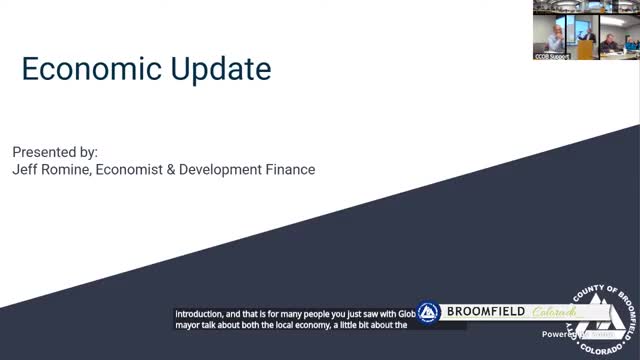County economist: Broomfield economy steady but global tariffs and trade slowdowns are risks
Get AI-powered insights, summaries, and transcripts
Subscribe
Summary
City economist Jeff Romine gave a broad economic update to the council, highlighting steady local indicators—low unemployment and modest inflation—while warning that tariffs and slower global growth could dampen future GDP and supply chains.
BROOMFIELD, Colo. — The city’s economic overview at Saturday’s focus session stressed that Broomfield’s economy remains generally strong while international and national policy risks could slow growth.
Jeff Romine, the city economist, told the council the community’s population as of July 2023 was “just short of 77,000 persons” and said local employment and wage figures remain favorable: the city’s unemployment rate is near 4.4% and the metro inflation rate cited for Broomfield was about 2.3%.
Nut graf: Romine said the local economy benefits from a diversified employment base — professional and tech services, management and manufacturing — but that trade policy, tariffs and weaker growth among trading partners are a material downside risk. He noted that producer price inflation outpacing consumer prices can foreshadow higher inflation later.
Romine walked council through sector-level detail: Broomfield’s average annual wages exceeded $109,000 for the fourth quarter of 2024, and the local employment base includes firms that continue to require on-site work (BAE Systems, among others) as well as more hybrid arrangements. He said he expects consumer behavior and workplace patterns (hybrid and remote work) to continue to affect commercial demand and collections for the city.
On trade and tariffs, Romine warned that higher tariffs tend to dampen GDP and disrupt parts and material supply chains; he noted recent tariff actions and said economists generally expect some tariffs to be introduced, creating uncertainty over the next 6–12 months.
Ending: Romine told council he will continue to monitor national and state fiscal decisions for their local impacts and suggested staff provide regular briefings so council can consider external economic risks when making policy and budget decisions.
